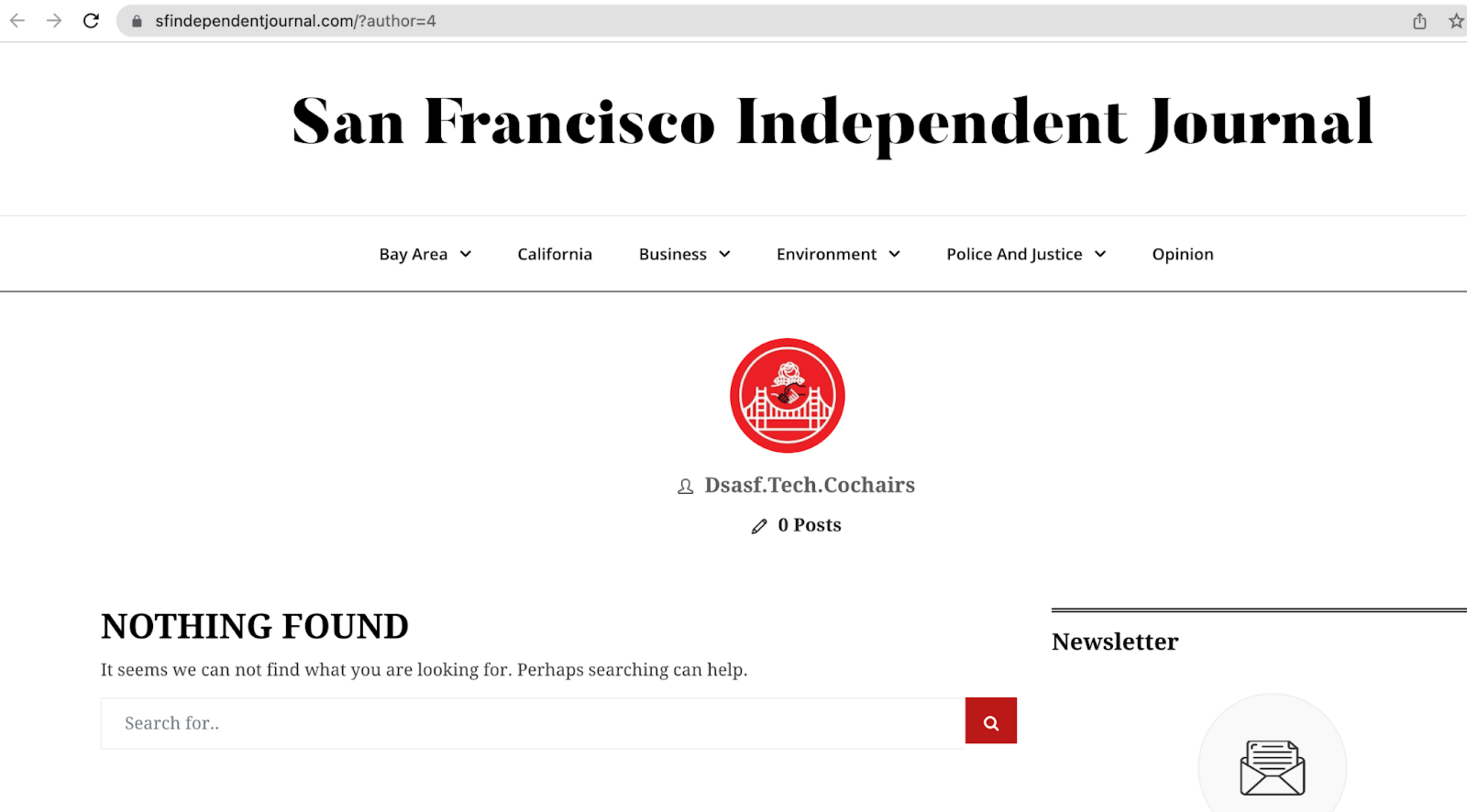Several days after San Franciscans recalled District Attorney Chesa Boudin, Supervisor Dean Preston took to Twitter to blast a scathing essay in (opens in new tab)The Atlantic (opens in new tab) that laid the city’s failures at the feet of its progressive policies on homelessness, drugs and prosecuting crime.
“I don’t know how anyone who is actually human (opens in new tab) could write this,” said Preston, a leader of the local Democratic Socialists of America.
An irony that was lost on the thousands of people who replied to, retweeted and liked Preston’s tweet is that the District 5 supervisor—a key player in promoting SF’s progressive agenda—has himself benefited from stories published before and after his 2020 re-election victory that appear to have been written by authors who are not real humans.
In July 2020, the San Francisco Independent Journal (opens in new tab) appeared as a website promising to deliver “unbiased local news coverage.” The website’s “about” statement does not identify any individuals, but says: “We are volunteer-run and don’t take money from advertisers or corporate donors, nor do we run for profit. Our investigative staff includes lawyers, data scientists, and reporting professionals who are committed to giving you the unvarnished truth.”
In reality, the San Francisco Independent Journal was created by the SF chapter of the Democratic Socialists of America (DSA). Multiple officials of the activist group, including Preston, confirmed to The Standard that the local DSA chapter launched the website, and a review of the website’s code shows that one of the first author profiles belonged to one of the chapter’s co-chairs.

The Standard, along with experts in online disinformation campaigns, reviewed authors’ pages on the website and found that more than a third of them do not appear to be real people. These writers, some of whom describe themselves as Bay Area residents with interests in “hiking up to Telegraph Hill (opens in new tab)” or “watching the sun rise after a long night of writing (opens in new tab),” do not have any online presence beyond the stories they wrote for the Independent Journal and their photos could not be verified as genuine.
Preston did not respond directly to The Standard’s questions about the website and its authors, but he did issue a statement through his office Wednesday.
“I believe The San Francisco Independent Journal is a volunteer effort that was started by some fellow members of DSA SF,” Preston said. “SFIJ is on our press list and receives our press releases.”
Tom Gallagher, a former state legislator in Massachusetts and a current member of the DSA who contributed a piece to the website, also confirmed that the SF Independent Journal was a local DSA project. He said he was surprised to learn that some of the authors might not be real and to see so many names he didn’t recognize.
“I guess you could say they’re not giving the ‘unvarnished’ truth if they’re not giving their real name,” Gallagher said.
The SF Independent Journal’s shadowy nature raises ethical concerns from both political and journalistic perspectives, experts on the media and disinformation campaigns told The Standard. Money spent to support a political candidate usually requires some form of disclosure under state law, but no such records could be found in connection to the SF Independent Journal.
And at a time when the agendas of news outlets are frequently challenged, so-called “astroturf (opens in new tab)” websites that are operated by a political party but claim to be “unbiased” can be especially dangerous in reducing trust in journalism.
“The boots on the ground sense of journalism only exists if the person has real boots on the ground,” said Subramaniam Vincent, director of the Journalism and Media Ethics program at Santa Clara University’s Markkula Center for Applied Ethics. “If this site has content by pseudo people that don’t exist, then that’s not journalism—fundamentally.”
No individual benefited from the SF Independent Journal’s coverage more than Preston. In the lead-up to a crucial runoff election in November 2020, when he defeated Vallie Brown to be re-elected to the Board of Supervisors, the website began publishing numerous stories touting his accomplishments. The positive coverage continued after Preston’s victory up until February of this year, often casting him as a champion for renters and labor unions. The top story on the website lauds Preston as the lone vote to defund the police and stand up for social housing (opens in new tab).
The site published more than 70 stories since its 2020 launch through February 2022, when the last fresh story appeared. More than a quarter of these stories either gave Preston a passing mention or more directly praised him. A glowing Q&A with Preston was shared by the supervisor on his Twitter account.
Kyle Heise, the reporter for the Q&A, did not respond to requests for comment but is a real person, members of the DSA told The Standard.
On top of the pro-Preston coverage, the website also published stories critical of his political opponents, including Mayor London Breed (opens in new tab) and Supervisor Myrna Melgar (opens in new tab).
The SF Independent Journal’s readership appears to be small, but the site did have one particularly important story ahead of the 2020 election. The article (opens in new tab)—written by Cyrus Kaviani, a writer whose identity could not be confirmed as authentic—quoted Preston and featured a YouTube video of Rep. Pramila Jayapal, Preston’s former sister-in-law, defending him against attack ads coming from the political action committee Neighbors for a Better San Francisco. (Disclosure: Michael Moritz, investor in The San Francisco Standard, contributed $300,000 to this committee in September 2020.)
The piece was one of the site’s best-performing stories and was shared by dozens of people on Twitter, including Preston. Jayapal’s office did not respond to a request for comment.
The extent of Preston’s role in the website is unclear. But one of the most active members in the local DSA chapter, Jen Snyder (opens in new tab), who was employed as Preston’s chief of staff at the time of the website’s creation, told The Standard she had no role in the site but there were “wonderful fucking people in the DSA writing for this.”
Snyder, who now runs the political consulting firm Red Bridge Strategies, said she was unaware some of the SF Independent Journal’s authors might be fake. But she added, “Who cares?”
Vincent called The Standard’s findings on the SF Independent Journal “mind-boggling.” He noted there is nothing wrong with the DSA or any other political group creating a news website as long as there is transparency on the funding and people conducting the work.
“My first reaction is if the authors are not real, if that’s the case, then it’s a non-starter as a journalistic outlet,” Vincent said. “Journalism doesn’t operate completely independent of values, and [it’s fine] as long as they’re open about their values.”
The Standard sent multiple emails requesting interviews with local DSA officials and a contact for the website’s editor, but neither responded.

Savannah Kuang, a freelancer who contributed stories for the website, told The Standard in a phone interview that the SF Independent Journal was a “volunteer project.” She declined to disclose who recruited her to write for the site and said she was unaware that some of the writers might not be real.
The website’s operators could not be verified, but a lookup of the domain owner leads to Gandi.net, a web company founded in France with offices in four countries, including a location on California Street in San Francisco. Gandi representatives said they could not release more details about the website owners due to legal requirements, but the company confirmed it provides a domain registration service and anti-spam email service for the website.
Jevin West, an assistant professor at the Information School at the University of Washington and co-author of the book “Calling Bullshit: The Art of Skepticism in a Data-Driven World (opens in new tab),” said he and his colleagues who research disinformation campaigns have seen similar websites to the SF Independent Journal, which are designed to shape the political discourse in a partisan direction.
He pointed to dozens of conservative-leaning websites (opens in new tab) that were created under innocuous names in Michigan to influence voters back in 2019, following similar astroturf news efforts in states (opens in new tab) like Ohio, Minnesota and Tennessee.
“We see it on the left and the right. It’s across the board,” West said. “But we need to be calling this out. Trust in journalism has been declining for many years now, and efforts like this further degrade that trust. Essentially, they’re pushing propaganda.”
Editor’s Note: An earlier version of this story referred to the Democratic Socialists of America as a political “party.” The DSA describes itself as a “political and activist organization” and is not registered as a political party.
